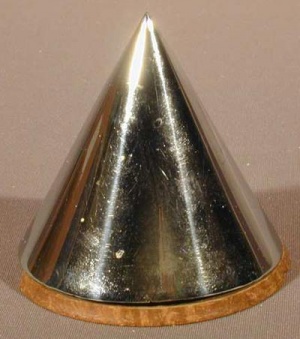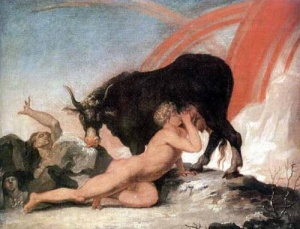Difference between revisions of "A"
m |
|||
| Line 45: | Line 45: | ||
'''Algernon'''<br /> | '''Algernon'''<br /> | ||
| − | 369; Ruperta's driver (?) | + | 369; Ruperta's driver (?); in Venice, 729; |
'''Algie'''<br /> | '''Algie'''<br /> | ||
Revision as of 18:50, 24 February 2007
A-and
5; 13; 109; 183; 420; 666
- Notable as a verbal tick of Tyrone Slothrop's in Gravity's Rainbow'.
absquatulate
8; run away; usually includes taking something or somebody along; 343; appears Latinate but is actually a 19th c. Americanism (compounded of two words), often used jocularly; thus deception & doubleness & humor in a single word, very Pynchonian!
Ace, Mr.
415; visitor from the future (Trespasser); 555;
Achphanomen
616;
Adam of Bremen
128; (also: Adam Bremensis) One of the most important German medieval chroniclers. He lived and worked in the second half of the 11th century. He is most famous for his chronicle Gesta Hammaburgensis Ecclesiae Pontificum (Deeds of Bishops of the Hamburg Church); Wikipedia entry
Adams, Maude (1872-1953)
338; American stage actress, most noted for her signature role, Peter Pan; Wikipedia entry
Addle, Ed
60; regular at Oil Well Saloon;
aeronaut: the pilot of a balloon or airship; Chicago World's Fair, 1893 and more here
Aether
55; 58; 132-133; 140; 306; 320; "sounds like light" 426; 458; 557; 565-66; 595; aka Akasa, 613; 620; aka Luminiferous aether ; Wikipedia article on Luminferous aether
aigrette
456; 721; 748; 813; Aigrette (from the French for egret, or lesser white heron), the tufted crest, or head-plumes of the egret, used for adorning a woman's head-dress, the term being also given to any similar ornament, in gems, &c. An aigrette is also worn by certain ranks of officers in the French army. By analogy the word is used in various sciences for feathery excrescences of like appearance, as for the tufts on the heads of insects, the feathery down of the dandelion, the luminous rays at the end of electrified bodies, or the luminous rays seen in solar eclipses, diverging from, the moon's edge. Wikipedia entry
Akashi, Baron
294; "roving military attaché" and "famous international spy"
akousmata
232; Greek: "things heard"; holds a much more secretive connotation like ‘signs’, or even perhaps ‘passwords’. These were explained as a set of rules of conduct used by the Pythagoreans. A few examples as given by Aristotle’s testimonies, like “abstain from beans as being due either to the fact that they resemble the genitals in shape, or because they resemble the gates of Hades." Also noted in this passage was “not to touch a white cock” and “not to touch any sacred fish” probably due to the earlier discussion on sacrifice.
Albert Lea
71; Pronounced "Albert Lee," a town in south-central Minnesota. It is also mentioned in passing in Gravity's Rainbow as the unlikely hometown of Pig Bodine: "Just a humble guy," the swarthy doughboy of the deep scratching in his groin after an elusive crab with a horn finger, rippling the ballooning pleats and fabric of his trousers, "just a freckleface kid from Albert Lea, Minnesota, down there on Route 69 where the speed limit's lickety-split.."; Google Map
alchemy
76-77; Alchemy refers to both an early form of the investigation of nature and an early philosophical and spiritual discipline, both combining elements of chemistry, metallurgy, physics, medicine, astrology, semiotics, mysticism, spiritualism, and art; and photography, 80; Wikipedia entry
Alfonsito
310; Jimmy Drop's lieutenant
Algernon
369; Ruperta's driver (?); in Venice, 729;
Algie
672; "flaneur of Ruperta's acquaintance"; a flaneur is a detached pedestrian observer of a metropolis, a 'gentleman stroller of city streets', first identified by Charles Baudelaire; Wikipedia entry
Alkali
Any of a group of basic, soluble salts. The term is derived etymologically from the Arabic for calcined ashes, from which the first alkalis were derived. They form a principle ingredient in soap production. Citation. "alkali dust, 207; "all the alkaline day," 214;
"All Pimps Look Alike to Me"'
48; an 1896 barroom ditty that was "cleaned up" to become "All Coons Look Alike to Me" and recorded by Arthur Collins in 1899 and considered by some to be the First Rock 'n' Roll Record. Read the whole story...
A.M.E.
702; Alternate Means of Egress
America
219; "innocent, all but oppressively wholesome"; and shame, 567; American light, 580; "delivered yourselves into the hands of capitalists and Christers" 643;
Amsterdam
107; Indian Ocean island; Megaera shipwrecked, 108;
249; a curved mirror or other optical device for giving a correct image of a picture or the like distorted by anamorphosis; paramorphic, 249;
Anarchism
6; "the inexorable rising tide of World Anarchism..."; 37; 43; 49-51; 60; 66; 87; 175 (as terrorists); 179; bomb factory in London, 235; 370; Barcelona in 1890s, 372; Anarchy Archives
Anarcho-syndicalists
14; Anarcho-syndicalism is a branch of anarchism which focuses on the labor movement. Syndicalisme is a French word meaning "trade unionism" – hence, the "syndicalism" qualification. Anarcho-syndicalists view labor unions as a potential force for revolutionary social change, replacing capitalism and the State with a new society democratically self-managed by workers. Wikipedia entry
Anemometer
6; An instrument for measuring wind speed; Robinson anemometer, 6 Wikipedia entry
Angels
10; "helples angel," 27; 42; "Archangels of municipal vengence," 150; "God's wing" (?), 211; "agencies of the angelic," 221; "Avenging Angels" 271; creatures, 277; H. Vanderjuice, 322; 332; birds, 336; 379; 389; Angel Street, 446; 531; in Venice, 575; "too bright to look at directly" 616; of deep shit, 619; 632; 642; Gentleman Bomber, as "messenger" 692; wings, 699;
Anglo-Russian Entente
631; the 1907 diplomatic accord between England and Russia to respect the integrity and independence of Persia.
Anharmonic Pencil
455; a "pencil" in this context refers to a figure formed by a set of straight lines or light rays meeting at a point, a figure that is not harmonic, i.e., not a multiple of its component parts; 532; 593;
Anti-Stone
78;
Apostles' Creed
58; The Apostles' Creed (circa 700 AD) (Latin: Symbolum Apostolorum), sometimes titled Symbol of the Apostles, is an early statement of Christian belief, a creed or "symbol." Wikipedia entry
Arbuckles
638; It was in the United States where coffee initially started to be commercialized. In 1865, John Arbuckle marketed the first commercially available packages of ground, roasted coffee. His brand, 'Ariosa', was sold over a far larger area then any other coffee roaster. Instead of being confined to a small area close to his roasting factory, Arbuckle was able to establish his coffee as a regional brand. Others soon followed suit and, by World War I, there were a number of regional roasters including companies such as Folgers, Hill Brothers, and Maxwell House; From Galla Coffee website
Archer, Mr.
467;
argentaurum
305-07; 375;
31; The Arkansas Toothpick is essentially a heavy dagger with a pointed, straight 12-20 inch blade. The "toothpick" is balanced and weighted for throwing and can also be used for thrusting and slashing. Wikipedia entry
arnophilia
211; A word invented by Pynchon. According to this website the greek word arnos generally refers to a lamb or sheep, but occasionally to a goat, too. Suffixes with the common part -phil- (-phile, -philia, -philic) are used to specify some kind of attraction or affinity to something, in particular the love or obsession with something. Wikipedia
Arriaga, Camilo
381; potosino; a leader of Mexican anarchist group founded by Enrico and Ricardo Flores Magon in 1882; on August 30, 1900, he published the manifesto Invitación al Partido Liberal in San Luis Potosi. This document sparked a movement leading to formation of the Partido Liberal Mexicano (PLM) five years later, and was Ricardo Flores Magón's main vehicle for organizing the anti-Diaz struggle and for spreading the ideals of anarchism throughout Mexico; Wikipedia - Anarchism in Mexico
Arvin
264; in the Nonpareil;
aryq
441; The Russian Turcologists Malov and Tenishev mention a Western Yugur word Aryq, meaning Chinese or muslim Turk. This is a loanword from Tibetan, A-rig, the name of a country of nomadic herdsmen situated to the west of Amdo. It originally may have referred to the local Tibetan population. But Pynchon's use suggests it is a drink. Hmmm.
Arak or araq is an anise-flavored liquor popular in the Middle East; Wikipedia entry
ässalamu äläykum
441; As-Salāmu `Alaykum (السلام عليكم) is an Arabic language greeting used in both Muslim and Christian cultures. It means "Peace be upon you." It is also transliterated as Assalamu 'Alaikum or As-salaamu Alaikum. The traditional response is "wa `Alaykum As-Salām", meaning "and peace on you". Wikipedia entry
"as above [...] so below"
439; 797; This phrase comes from the beginning of The Emerald Tablet and embraces the entire system of traditional and modern magic which was inscribed upon the tablet in cryptic wording by Hermes Trismegistus. The significance of this phrase is that it is believed to hold the key to all mysteries. All systems of magic are claimed to function by this formula. "'That which is above is the same as that which is below'...Macrocosmos is the same as microcosmos. The universe is the same as God, God is the same as man, man is the same as the cell, the cell is the same as the atom, the atom is the same as...and so on, ad infinitum." [1]
Astarte-Bad
714; in Vienna, with lurid mosaics of pre-biblical orgies; Astarte is a pre-biblical goddess of fertility, sexuality and war; Wikipedia entry
"at silly point"
222; "silly point" is a position in the game of cricket, played close to the batsman
Aubergine, Madame
367, gives Reef Traverse dancing lessons in Denver, "aubergine" means eggplant, both the vegetable and the color;
142; The primeval cow. Audumla (Audhumla) was born from rime at Ginnungagap. The primeval giant Ymir (Aurgelmir) lived on the milk that flow from the cow's teats. Audumla also provided nourishment to Ymir's six-headed son. Audumla received nourishment through licking the salty rime-stones. Audumla licked the stone until it was shaped into a man. This stone became Buri, grandfather of the Aesir gods: Odin, Vili and Ve.
Aughrim
231; The Battle of Aughrim was the decisive battle of the Williamite War in Ireland. It was fought between the Jacobites and the forces of William III on 12 July 1691, near the village of Aughrim in County Galway; Wikipedia entry
August, Ernst
230; Crown Prince Ernst August II of Hanover, 3rd Duke of Cumberland and Teviotdale, (Ernst August Wilhelm Adolf Georg Friedrich) (21 September 1845-14 November 1923), was the eldest child and only son of King George V of Hanover and his wife, Princess Marie of Saxe-Altenburg. Ernst August had the misfortune of being deprived of the thrones of Hanover upon its annexation by Prussia in 1866 and later the Duchy of Brunswick in 1884. Although he was the senior male-line great grandson of King George III, the Duke of Cumberland was deprived of his British peerages and honours for having sided with Germany in World War I; [2]
Automorphic Dispensation
453;
Avery
193; a company inspector or spy (indeterminate)
Aychrome, Police Inspector Vance
605; at Chunxton Crescent;
Azeff, Monsieur Yevno
720; Yevno Azef (also spelled Azev) was a double agent in a big way, working for both Russia's turn-of-the-century revolutionaries and the Czar's Okhrana. He was convicted of attempting to assassinate Tsar Nicholas II and was executed in 1911. He was also a founder of the Social Revolutionary Party.
Aziz, Abdel
520; "young sultan" in Morocco
Aztecs
394; "foundation story of the eagle and the serpent"
Aztlàn
214; Aztlán (believed to mean "place of whiteness" or "place of herons," derived from the Nahuatl words "aztatl" (herons or white-plumed birds) and "tlan" ("place among") is the legendary ancestral home of the Nahua peoples, one of the main cultural groups in Mesoamerica. "Azteca" is the Nahuatl word for "people from Aztlan." While some legends describe Aztlán as a paradise, the Aubin Codex says that the Aztecs were subject to a tyrant elite called the Azteca Chicomoztoca. Guided by their priest, the Aztec fled, and on the road, their god Huitzilopochtli forbade them to call themselves Azteca, telling them that they should be known as Mexica (pronounced /meʃiko/). Ironically, the scholars of the 19th century would name them Aztec; "ghosts of..."; 277; "mythical homeland of" 923; Wikipedia


